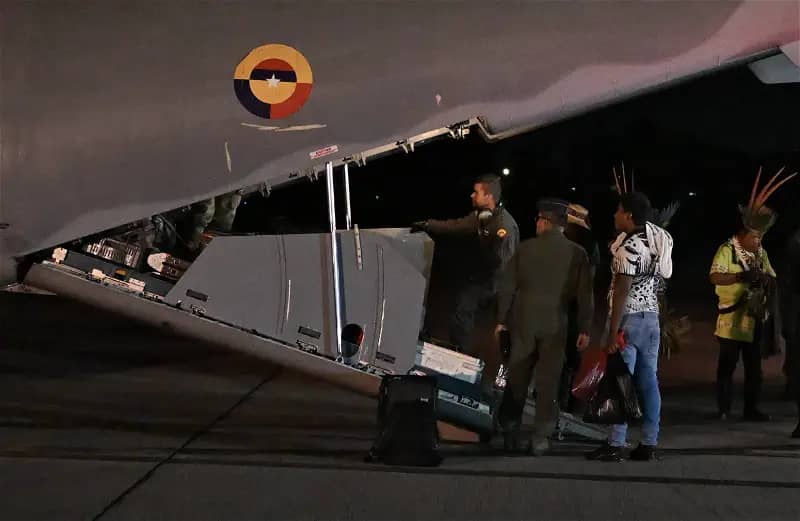International News
Missing Children Found Alive In Colombian Amazon After 40 Days

President Gustavo Petro announced on Friday that four Indigenous children, who had been missing for over a month following a small plane crash in the Colombian Amazon rainforest, have been discovered alive.
Sharing the news with the media in the capital city of Bogota, Petro described the day as “magical” after revealing the successful rescue of the children.
He said “They are weak. Let’s let the doctors make their assessment.”
Earlier, President Gustavo Petro took to Twitter and shared a photograph depicting several adults, some wearing military fatigues, attending to the children who were seated on tarps in the midst of the jungle. In the image, a rescuer could be seen holding a bottle to the mouth of the youngest child, cradling them in their arms.
“A joy for the whole country! The 4 children who were lost 40 days ago in the Colombian jungle were found alive,” he wrote on Twitter.
Late on Friday, the Defense Ministry shared a video capturing the moment the children were lifted into a hovering helicopter, surrounded by the towering trees in nearly pitch-black darkness.
Belonging to the Huitoto Indigenous group, the children, aged 13, nine, four, and one, had been traversing the jungle alone since May 1, when the Cessna 206 aircraft they were traveling in crashed.
The pilot had alerted authorities about engine issues shortly after departure from the Araracuara region, located around 350 kilometers (217 miles) away from the town of San Jose del Guaviare.
Tragically, the remains of the pilot, the children’s mother, and a local Indigenous leader were discovered at the crash site, where the plane was lodged almost vertically amidst the trees.
Authorities later revealed that the group had been escaping from threats posed by members of an armed group, shedding light on the circumstances surrounding their ill-fated journey.
Since the children went missing, an extensive search operation involving 160 soldiers and 70 Indigenous individuals with deep knowledge of the jungle had been underway, attracting global attention.
The region where the children were lost is inhabited by jaguars, snakes, and other predatory animals, as well as armed drug smuggling groups.
However, ongoing clues such as footprints, a diaper, and partially consumed fruit gave authorities hope that they were on the right path.
Concerned that the children might continue to wander, making it increasingly challenging to locate them, the air force dropped 10,000 flyers into the forest. The flyers contained instructions in both Spanish and the children’s own Indigenous language, urging them to stay in one place.
In addition to instructions, the leaflets provided crucial survival tips, and the military delivered food parcels and bottled water to aid the children in their survival.
Rescuers also took the initiative to broadcast a recorded message from the children’s grandmother, imploring them to remain stationary and await help.
After an arduous search effort, the military reported that the children were discovered approximately five kilometers (three miles) to the west of the crash site, bringing immense relief to all involved.
The Huitoto children, being part of the Huitoto Indigenous group, possess extensive knowledge of hunting, fishing, and gathering in the jungle. The children’s grandfather, Fidencio Valencia, shared with AFP that they are well-versed in navigating and surviving in the wilderness.
The news of the successful rescue coincided with President Gustavo Petro’s return from Cuba. During his visit, he had signed a six-month truce with the ELN, Colombia’s last active guerrilla group. The rescue brought a sense of joy and relief amidst the backdrop of this significant development in the country’s peace efforts.
International News
Samsung Electronics Co-CEO, Han Jong-hee Dies At 63

Han Jong-hee, co-CEO of Samsung Electronics and a driving force behind the company’s dominance in the global television market, has died of a heart attack at the age of 63, the company confirmed on Tuesday.
“He died from cardiac arrest today,” a Samsung spokesperson stated, adding that Han is survived by his wife and three children.
Having joined the company in 1988, Han played a significant role in shaping Samsung’s television business.
READ MORE: Samsung Reports Worst Quarterly Profits In 14 Years
His leadership was instrumental in the launch and success of the company’s high-end LED TVs, which helped establish Samsung as a global leader in the industry.
“Han was central in the unveiling of Samsung’s world-class LED TVs,” the company noted in a biography published earlier this month. “His numerous other innovations enabled the company to continually demonstrate its technology leadership.”
His efforts ensured that Samsung maintained its position as a dominant force in the global television market.
Han’s death comes at a time when Samsung Electronics is grappling with challenges in the AI chip sector.
The company has been facing difficulties in meeting Nvidia’s standards, while its South Korean competitor, SK Hynix, has emerged as the leading supplier of high-bandwidth memory (HBM) chips for Nvidia’s AI processors.
Chairman Lee Jae-yong recently underscored the urgency of the situation, urging Samsung to adopt a “do-or-die” approach to overcome the growing challenges in the AI industry.
Last October, the company acknowledged it was facing a “crisis,” citing concerns over its “fundamental technological competitiveness and the future of the company.”
International News
Pope Francis To Return To Vatican After Month-Long Treatment
Pope Francis will on Sunday be discharged from Rome’s Gemelli hospital, where he has been receiving treatment since February 14 for breathing difficulties and pneumonia.
The 88-year-old pontiff will return to his residence at Saint Martha’s House in the Vatican, where doctors have advised that he undergo “a long convalescence… of at least two months.”
Speaking to reporters on Saturday, Dr. Sergio Alfieri explained that while the pope’s health is improving, further recovery is best achieved at home.
READ ALSO: Pope Francis’ Condition Improving, Says Vatican
“Further progress will take place at his home, because a hospital — even if this seems strange — is the worst place to recover because it’s where one can contract more infections,” Alfieri said.
Dr. Luca Carbone, another physician at Gemelli, added that there are positive signs in the pope’s condition. “We hope that he will soon be able to resume his normal activities,” he stated.
Before leaving the hospital, Pope Francis is expected to greet the public and offer a blessing from a hospital balcony after the Angelus prayers on Sunday, marking his first appearance in weeks.
Speculation about a possible resignation has been circulating due to the pope’s prolonged absence from public duties, but Vatican officials have firmly denied such claims.
When asked if the topic had been discussed, Vatican Secretary of State Pietro Parolin was clear in his response: “No, no, no, absolutely not.”
The pope, who had part of a lung removed in his youth, has received an outpouring of prayers and well-wishes from Catholics worldwide.
Supporters have been gathering outside Gemelli hospital, leaving flowers, candles, and messages of encouragement.
His hospitalization, the longest of his papacy has led to questions about how Easter celebrations will be handled in his absence.
However, Vatican officials remain optimistic about his gradual return to his duties in the coming weeks.
International News
Memphis Man Accidentally Shot By His Own Dog

A Memphis man was accidentally shot by his own dog after the pet jumped onto his bed and triggered a loaded firearm, police confirmed on Wednesday.
The incident occurred early Monday morning while the man was asleep alongside his female partner.
According to police reports, the couple’s one-year-old pit bull, Oreo, inadvertently discharged the weapon after getting its paw stuck in the trigger guard.
READ ALSO: Nigerian Woman Mauled To Death By Stray Dogs In Italy
The bullet grazed the man’s left thigh, causing a minor injury that was treated at a local hospital.
The victim’s girlfriend, who spoke to Fox 13 Memphis, described Oreo as a playful dog and recounted the shocking moment the firearm discharged.
“The dog is a playful dog, and he likes to jump around and stuff like that, and it just went off,” she said. Reflecting on the incident, she added: “Keep the safety on or use a trigger lock.”
Police have classified the case as an “accidental injury” and have not disclosed the type of firearm involved.
Although gun-related incidents are frequent in the United States, cases involving animals firing weapons are rare.
In a similar case in 2023, a Kansas man was killed when his German shepherd stepped on a hunting rifle.
A comparable incident in 2018 saw an Iowa man accidentally shot in the leg by his pit bull-Labrador mix.
Authorities are using the Memphis case as a reminder of firearm safety, urging gun owners to secure their weapons properly to prevent unintended discharges.














